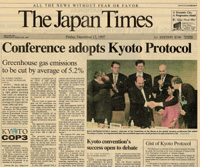Starting tomorrow, nearly 200 countries will meet for the 18th Conference of the Parties (COP18) of the United Nations Framework Convention on Climate Change (UNFCCC). This year, the annual conference will take place in Doha, Qatar. This is the same UN group that negotiated the Kyoto Protocol back in 1997. However, since the Kyoto Protocol (under which countries agreed to reduce their carbon emissions by a certain percent of 1990 levels) is set to expire at the end of this year, agreeing on an extension of Kyoto or creating a new protocol is especially important for this conference.

The Kyoto Protocol is widely considered a failure due to its lack of punishment for countries not adhering to its guidelines, the ease of withdrawal (Canada withdrew last year), and the exemption of developing countries (China and India's greenhouse emissions are virtually unregulated). The United States, one of the largest countries and one of the biggest contributors to worldwide greenhouse emissions, rejected Kyoto due to the exemption of developing countries.
As very few countries have agreed to negotiate a second commitment period under Kyoto, the delegates in Doha will likely begin work on a new worldwide treaty to be ratified in 2015 and take effect in 2020. Whether or not they're able to come up with a treaty that actually works remains to be seen Financing such a treaty is also an issue, requiring wealthy countries to support less wealthy countries. Regardless, global warming remains a problem that needs to be addressed soon. Can the UNFCCC finally come up with a good way to lower worldwide carbon emissions?

5 comments:
Although listing "punishments" under the body of the UN in any legislation they pass is a difficult task, I do hope that the body does come to a solution better than that of Kyoto. While the sentiments behind it were commendable, the actually implementation did not work as well as it could have. This time putting limits on all nations, regardless of development level, would be an important place to start. As the years go on and carbon levels rise, the more difficult it becomes to undo the damage. It would behoove all nations if they would take steps to controlling and eventually resolving the issue in this upcoming conference. While one or two nations make take the lead at the Convention, it will require the participation of many nations to come to a truly effective solution. That means that the biggest carbon dioxide emitting nations cannot back out.
Whether or not this conference actually produces a successful treaty, it is important that it is occurring. The simple calling of the UNFCCC is a step in the right direction, and shows that the UN isn’t dwelling upon the failures of the Kyoto Protocol.
I do think that the conference will produce great ideas on how to effectively lower worldwide carbon emissions, I just worry about how many of those ideas will actually be pursued, and of those ideas, how many will be followed. In my mind, there exist two options. One, the treaties could be crafted in such a way that only those countries who will abide sign. (Sounds obvious, but could include many separate treaties involving select countries rather than one large, encompassing compromise.) Two, those attending the conference could devote extra efforts towards brainstorming exactly how what is decided upon will be implemented. (Which should be done regardless.)
In terms of financing the solutions created, however, I think it would be beneficial to provide incentives to those wealthy nations who will be doing much of the heavy lifting.
Although it is admirable that the UNFCCC is working to remake the Kyoto protocol I do not think it is the best solution to curb excessive carbon emissions. The United Nations simply does not have enough power to force any nation to abide by any regulations. Individual nations need to take responsibility for their own environment and pass independent legislature that will help to stop global warming. The UN and pressure from other nations are strong influences on a country's willingness to make such laws but a new Kyoto protocol will not be the ultimate solution.
Although I think that the UN Climate Change conferences are commendable in principle, their success at actually accomplishing something have been less than adequate.
An exception would be the United Nation's Montreal Protocol in 1987, which actually lowered the levels of harmful, ozone-depleting CFCs in the atmosphere. I think that the specificity of the protocol's goal was a factor in the effectiveness of this protocol. In contrast, the Kyoto Protocol (and the treaty that the UN will attempt to create in Doha) seeks to "reduce carbon emissions." Because there are a vast amount of sources that emit carbon dioxide, and therefore, numerous ways to curb CO2 levels, this vague goal makes it hard to create a specific treaty that is easy for countries to obey.
The widely-anticipated 2009 Copenhagen Conference only ended in disappointment. Hopefully the Doha Conference will be different!
I do agree that the UNFCCC only has limited power and any treaty they come up with will most likely not be as effective as they hope. A stricter, more specific treaty, or multiple treaties (as Sally suggested) would be more beneficial and effective than the current Kyoto Protocol. However, no treaty is going to work unless the individual countries agree to make these changes, which is not extremely likely.
Although a new treaty is clearly not the ultimate solution, I think it is important that the conference is happening. Even though the results may be limited, it will be better than making absolutely no changes. Hopefully the UNFCCC will be able to create a new plan to lower carbon emissions that will force more countries to participate and obey.
Post a Comment